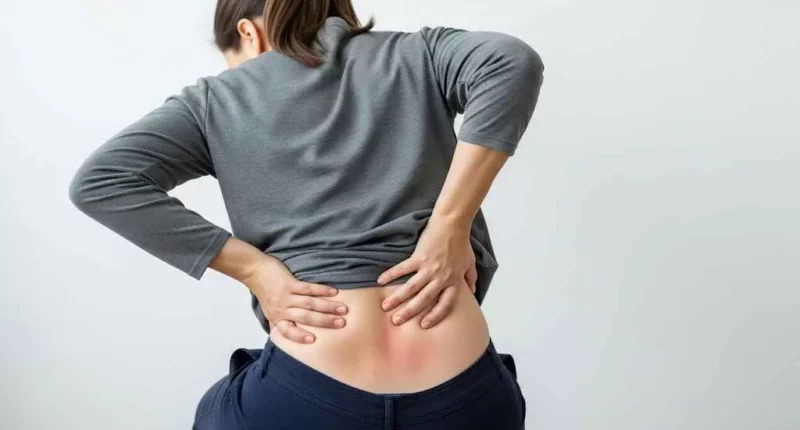Share this @internewscast.com
Been feeling a persistent dull ache in your lower back that coincides with the time when your hemorrhoid symptoms worsen? Although hemorrhoids are infamous for making sitting a painful experience, many individuals quietly ponder whether their back pain is in any way related to the issues they’re experiencing down below.
The upside is that you’re on the right track. This inquiry is all about getting to know your body more thoroughly. Sometimes, the source of the pain isn’t where you might initially suspect.
Can Hemorrhoids Cause Back Pain?
Hemorrhoids are swollen veins located in the rectum or anus, and they have the potential to make daily life quite uncomfortable. From itching to burning and all the unpleasant sensations in between, they impact more than just your trips to the bathroom. But what about that pesky back pain?
Now here’s something most folks don’t know: about 39% of individuals undergoing routine colorectal cancer screenings were found to have hemorrhoids, and more than half of them didn’t even know it. That’s right, many people walk around with silent hemorrhoids, but once symptoms flare, that pain often drags other discomforts in with it, especially in the lower back area.
Here’s how they’re often linked:
-
Long sitting sessions cause pressure on your spine and the anal area
-
Constipation strains muscles you didn’t even know you had
-
Inactivity makes blood flow sluggish, which doesn’t help either issue
So, while back pain doesn’t start because of hemorrhoids, both might point to a shared root cause.
Why Some People Associate Hemorrhoids with Back Pain
People often feel pain in more than one area but don’t realize what’s causing what. Hemorrhoids and lower back pain tend to pop up together, especially in people dealing with chronic constipation or a sedentary lifestyle. If your job has you parked in a chair all day, or if you’ve just had a baby, you might recognize the pattern.
Let’s talk about symptoms. Hemorrhoids bring swelling, itching, and pain around the anal region. Back pain? That tightness across your lower spine or hips. It’s subtle until it isn’t. Many end up blaming their back pain on a bad mattress or a long drive, when really, it’s that straining in the bathroom that kicked off the whole chain.
Here’s what usually happens:
Even posture takes a hit. If you’re sitting awkwardly to avoid irritating hemorrhoids, your spine’s alignment can get thrown off. Small adjustments in how you sit or walk can quietly wear down your back over time.
Common ways hemorrhoids and back pain overlap:
-
Prolonged sitting: Increases pelvic pressure and compresses the lower back.
-
Poor posture from pain: Trying to avoid hemorrhoid pain causes odd sitting angles.
-
Tensed abdominal muscles: Straining builds tension in the lower spine.
-
Pain referral: Some people interpret anal pain as lower back pain.
When Back Pain Might Not Be From Hemorrhoids
Here’s the thing: just because you have hemorrhoids doesn’t mean your back pain is tied to them. Look, sometimes back pain is just back pain. No hidden cause. But other times, it signals something more serious.
Let’s break it down. Hemorrhoids do not affect the spine, nerves, or muscles in your back. If your back pain is sharp, constant, or radiating down your leg, chances are, something else is going on, maybe a slipped disc or sciatica.
Signs your back pain probably isn’t from hemorrhoids:
-
Shooting pain down your legs
-
Numbness or tingling
-
Weakness in the lower limbs
-
Pain gets worse when walking or bending, not sitting
These aren’t things hemorrhoids can do. They don’t mess with nerves or cause leg pain. That’s why it’s important to track what else you’re feeling and not just chalk it all up to one issue.
Also, keep in mind age. Degenerative disc disease, arthritis, or herniated discs become more common with age. And guess what? So do hemorrhoids. They just happen to show up at the same stage of life, adding to the confusion.
Here’s a quick comparison:
|
Symptom |
Likely Hemorrhoids |
Likely Back Issue |
|
Pain when sitting |
yes |
yes |
|
Pain radiating down the leg |
no |
yes |
|
Relief after bowel movement |
yes |
no |
|
Tingling or numbness |
no |
yes |
|
Localized rectal itching/burning |
yes |
no |
|
Spinal stiffness or tightness |
no |
yes |
So yeah, there’s some overlap. But it’s worth looking deeper. Don’t self-diagnose if the pain lingers or spreads.
Tips to Relieve Hemorrhoid and Back Pain Symptoms
Managing both conditions at once can feel like juggling fire. But relief is possible if you’re willing to tweak a few habits. It starts with listening to your body and doing less of what irritates it.
Here’s the breakdown:
1. Fix the bathroom routine
Straining is the enemy. Try to:
-
Increase water intake (at least 8–10 glasses daily)
-
Add fiber (aim for 25–30 grams/day)
-
Avoid sitting on the toilet for more than 5 minutes
Look for fiber from natural foods, not just powders. Oats, prunes, and lentils work better when part of a real meal.
2. Move more, sit less
Inactivity fuels both problems. Exercise boosts circulation and keeps stools soft.
-
Try walking 30 minutes a day
-
Gentle stretching, like yoga, supports your back
-
Use a sit-stand desk if you’re tied to a chair
Back pain often improves just by standing up more often. Hemorrhoids do too.
3. Try targeted relief methods
Use ice packs or warm compresses on the lower back. For hemorrhoids, consider:
4. Rethink your posture
Slouching worsens both conditions. Sit upright, use lumbar support, and avoid pressure on your tailbone.
-
Keep knees a bit higher than hips when seated
-
Use a donut cushion if hemorrhoids are flaring
-
Change sitting positions every 30 minutes
Little changes. Big difference.
How to Prevent Hemorrhoids and Associated Discomfort
Prevention is better than treatment, especially when pain gets personal. Preventing hemorrhoids can reduce your chance of dealing with both the discomfort and the weird back pain that sometimes tags along.
Stay regular
Fiber and fluids matter. But consistency is the key.
-
Stick to meal routines
-
Don’t skip water during travel or stress
-
Avoid heavy, greasy foods that clog the pipes
Avoid strain triggers
Whether it’s lifting boxes or holding in a bowel movement, don’t.
-
Use proper form when lifting (bent knees, straight back)
-
Go when the urge strikes. Don’t wait.
-
Avoid tight belts or waistbands that restrict movement
Strengthen your core
A strong core supports your lower back and helps maintain good posture.
Prevention isn’t glamorous, but it works quietly in the background. Do enough of it, and you won’t need to treat the same thing twice.
When to Talk to Your Doctor
If back pain doesn’t let up after a week, or if hemorrhoids become chronic or start bleeding heavily, don’t wait. Same goes for pain spreading to your legs or changes in bowel habits that feel off. Doctors can run tests, rule out other causes, and suggest real treatment. Don’t tough it out unnecessarily.
Final Thoughts
Can hemorrhoids cause back pain? Not directly, but the two are tangled by lifestyle, habits, and sometimes plain bad luck. Get moving, eat better, and pay attention to pain that sticks around. You don’t have to live in discomfort. Relief is possible, and it usually starts with small, quiet changes.












